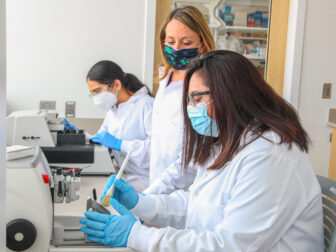Marek Zorawski

And … Cut! Reversing Therapy Resistance in Prostate Cancer by Targeting Gene Assembly
Summary
When making a movie, a lot of content is recorded, but only the best scenes are stitched together into the final film. In our cells, a similar editing process occurs for making proteins, the building blocks of cells. Our DNA contains all the information to create proteins — the full roll of film, so to speak — but then molecules called RNA are stitched together to form the final blueprint for making proteins. This assembly process, called RNA splicing, can go haywire in aggressive cancers, including a treatment-resistant form of prostate cancer. When prostate cancer has reached this form, patients have a poor prognosis, making RNA splicing an attractive therapeutic target to revert the patient’s cancer to a treatment-sensitive form. My research focuses on finding a signal on a single RNA that we can target to help shut down the cancer-specific splicing. We hope to create new drugs that can block that signal and stitch together healthy RNAs that revert the cancer to treatment sensitivity and promote longer, healthier lives for patients with aggressive prostate cancer.
Watch a Q&A with Marek
For many patients, the standard-of-care treatments we provide for prostate cancer in the clinic result in resistance to these drugs. This PhRMA Foundation award will help my work that focuses on targeting an RNA splicing process that contributes to this treatment resistance in many cases. I hope the development of these drugs will not only help patients with aggressive prostate cancer but will also pave a way toward the development of new RNA-targeting medicines for cancer patients more broadly.

